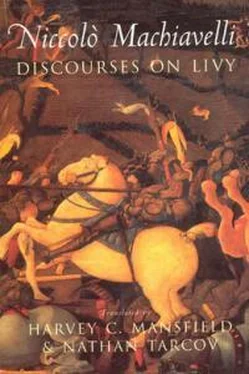Николо Макиавелли - Discourses on Livy
Здесь есть возможность читать онлайн «Николо Макиавелли - Discourses on Livy» весь текст электронной книги совершенно бесплатно (целиком полную версию без сокращений). В некоторых случаях можно слушать аудио, скачать через торрент в формате fb2 и присутствует краткое содержание. Год выпуска: 2014, Издательство: epubBooks Classics, Жанр: История, Философия, на английском языке. Описание произведения, (предисловие) а так же отзывы посетителей доступны на портале библиотеки ЛибКат.
- Название:Discourses on Livy
- Автор:
- Издательство:epubBooks Classics
- Жанр:
- Год:2014
- ISBN:нет данных
- Рейтинг книги:5 / 5. Голосов: 1
-
Избранное:Добавить в избранное
- Отзывы:
-
Ваша оценка:
- 100
- 1
- 2
- 3
- 4
- 5
Discourses on Livy: краткое содержание, описание и аннотация
Предлагаем к чтению аннотацию, описание, краткое содержание или предисловие (зависит от того, что написал сам автор книги «Discourses on Livy»). Если вы не нашли необходимую информацию о книге — напишите в комментариях, мы постараемся отыскать её.
Discourses on Livy — читать онлайн бесплатно полную книгу (весь текст) целиком
Ниже представлен текст книги, разбитый по страницам. Система сохранения места последней прочитанной страницы, позволяет с удобством читать онлайн бесплатно книгу «Discourses on Livy», без необходимости каждый раз заново искать на чём Вы остановились. Поставьте закладку, и сможете в любой момент перейти на страницу, на которой закончили чтение.
Интервал:
Закладка:
Desiring, therefore, to discuss the nature of the government of Rome, and to ascertain the accidental circumstances which brought it to its perfection, I say, as has been said before by many who have written of Governments, that of these there are three forms, known by the names Monarchy, Aristocracy, and Democracy, and that those who give its institutions to a State have recourse to one or other of these three, according as it suits their purpose. Other, and, as many have thought, wiser teachers, will have it, that there are altogether six forms of government, three of them utterly bad, the other three good in themselves, but so readily corrupted that they too are apt to become hurtful. The good are the three above named; the bad, three others dependent upon these, and each so like that to which it is related, that it is easy to pass imperceptibly from the one to the other. For a Monarchy readily becomes a Tyranny, an Aristocracy an Oligarchy, while a Democracy tends to degenerate into Anarchy. So that if the founder of a State should establish any one of these three forms of Government, he establishes it for a short time only, since no precaution he may take can prevent it from sliding into its contrary, by reason of the close resemblance which, in this case, the virtue bears to the vice.
These diversities in the form of Government spring up among men by chance. For in the beginning of the world, its inhabitants, being few in number, for a time lived scattered after the fashion of beasts; but afterwards, as they increased and multiplied, gathered themselves into societies, and, the better to protect themselves, began to seek who among them was the strongest and of the highest courage, to whom, making him their head, they tendered obedience. Next arose the knowledge of such things as are honourable and good, as opposed to those which are bad and shameful. For observing that when a man wronged his benefactor, hatred was universally felt for the one and sympathy for the other, and that the ungrateful were blamed, while those who showed gratitude were honoured, and reflecting that the wrongs they saw done to others might be done to themselves, to escape these they resorted to making laws and fixing punishments against any who should transgress them; and in this way grew the recognition of Justice. Whence it came that afterwards, in choosing their rulers, men no longer looked about for the strongest, but for him who was the most prudent and the most just.
But, presently, when sovereignty grew to be hereditary and no longer elective, hereditary sovereigns began to degenerate from their ancestors, and, quitting worthy courses, took up the notion that princes had nothing to do but to surpass the rest of the world in sumptuous display and wantonness, and whatever else ministers to pleasure so that the prince coming to be hated, and therefore to feel fear, and passing from fear to infliction of injuries, a tyranny soon sprang up. Forthwith there began movements to overthrow the prince, and plots and conspiracies against him undertaken not by those who were weak, or afraid for themselves, but by such as being conspicuous for their birth, courage, wealth, and station, could not tolerate the shameful life of the tyrant. The multitude, following the lead of these powerful men, took up arms against the prince and, he being got rid of, obeyed these others as their liberators; who, on their part, holding in hatred the name of sole ruler, formed themselves into a government and at first, while the recollection of past tyranny was still fresh, observed the laws they themselves made, and postponing personal advantage to the common welfare, administered affairs both publicly and privately with the utmost diligence and zeal. But this government passing, afterwards, to their descendants who, never having been taught in the school of Adversity, knew nothing of the vicissitudes of Fortune, these not choosing to rest content with mere civil equality, but abandoning themselves to avarice, ambition, and lust, converted, without respect to civil rights what had been a government of the best into a government of the few; and so very soon met with the same fate as the tyrant.
For the multitude loathing its rulers, lent itself to any who ventured, in whatever way, to attack them; when some one man speedily arose who with the aid of the people overthrew them. But the recollection of the tyrant and of the wrongs suffered at his hands being still fresh in the minds of the people, who therefore felt no desire to restore the monarchy, they had recourse to a popular government, which they established on such a footing that neither king nor nobles had any place in it. And because all governments inspire respect at the first, this government also lasted for a while, but not for long, and seldom after the generation which brought it into existence had died out. For, suddenly, liberty passed into license, wherein neither private worth nor public authority was respected, but, every one living as he liked, a thousand wrongs were done daily. Whereupon, whether driven by necessity, or on the suggestion of some wiser man among them and to escape anarchy, the people reverted to a monarchy, from which, step by step, in the manner and for the causes already assigned, they came round once more to license. For this is the circle revolving within which all States are and have been governed; although in the same State the same forms of Government rarely repeat themselves, because hardly any State can have such vitality as to pass through such a cycle more than once, and still together. For it may be expected that in some sea of disaster, when a State must always be wanting prudent counsels and in strength, it will become subject to some neighbouring and better–governed State; though assuming this not to happen, it might well pass for an indefinite period from one of these forms of government to another.
I say, then, that all these six forms of government are pernicious—the three good kinds, from their brief duration the three bad, from their inherent badness. Wise legislators therefore, knowing these defects, and avoiding each of these forms in its simplicity, have made choice of a form which shares in the qualities of all the first three, and which they judge to be more stable and lasting than any of these separately. For where we have a monarchy, an aristocracy, and a democracy existing together in the same city, each of the three serves as a check upon the other.
Among those who have earned special praise by devising a constitution of this nature, was Lycurgus, who so framed the laws of Sparta as to assign their proper functions to kings, nobles, and commons; and in this way established a government, which, to his great glory and to the peace and tranquility of his country, lasted for more than eight hundred years. The contrary, however, happened in the case of Solon; who by the turn he gave to the institutions of Athens, created there a purely democratic government, of such brief duration, that I himself lived to witness the beginning of the despotism of Pisistratus. And although, forty years later, the heirs of Pisistratus were driven out, and Athens recovered her freedom, nevertheless because she reverted to the same form government as had been established by Solon, she could maintain it for only a hundred years more; for though to preserve it, many ordinances were passed for repressing the ambition of the great and the turbulence of the people, against which Solon had not provided, still, since neither the monarchic nor the aristocratic element was given a place in her constitution, Athens, as compared with Sparta, had but a short life.
But let us now turn to Rome, which city, although she had no Lycurgus to give her from the first such a constitution as would preserve her long in freedom, through a series of accidents, caused by the contests between the commons and the senate, obtained by chance what the foresight of her founders failed to provide. So that Fortune, if she bestowed not her first favours on Rome, bestowed her second; because, although the original institutions of this city were defective, still they lay not outside the true path which could bring them to perfection. For Romulus and the other kings made many and good laws, and such as were not incompatible with freedom; but because they sought to found a kingdom and not a commonwealth, when the city became free many things were found wanting which in the interest of liberty it was necessary to supply, since these kings had not supplied them. And although the kings of Rome lost their sovereignty, in the manner and for the causes mentioned above, nevertheless those who drove them out, by at once creating two consuls to take their place, preserved in Rome the regal authority while banishing from it the regal throne, so that as both senate and consuls were included in that republic, it in fact possessed two of the elements above enumerated, to wit, the monarchic and the aristocratic.
Читать дальшеИнтервал:
Закладка:
Похожие книги на «Discourses on Livy»
Представляем Вашему вниманию похожие книги на «Discourses on Livy» списком для выбора. Мы отобрали схожую по названию и смыслу литературу в надежде предоставить читателям больше вариантов отыскать новые, интересные, ещё непрочитанные произведения.
Обсуждение, отзывы о книге «Discourses on Livy» и просто собственные мнения читателей. Оставьте ваши комментарии, напишите, что Вы думаете о произведении, его смысле или главных героях. Укажите что конкретно понравилось, а что нет, и почему Вы так считаете.











